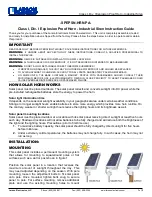
Baumer_ProfibusDPV0_BIDE_MA_EN.docx
14/26
Baumer IVO GmbH & Co. KG
11.19
Villingen-Schwenningen, Germany
8.
Diagnostic signals
Diagnostic signals contain data relating to the respective status of the encoder. The diagnostic signals
comprise Profibus-relevant information and device-specific information. The master controls communication
with the slave using this information, or forwards it to the higher-level system.
The master requests diagnosis data both prior to parameterization and after configuration of the slave.
This ensures that the slave is present in the bus and that the data stored in the control system software is in
agreement with the data stored in the slave. The slave can also register a diagnosis event in the
Data_Exchange mode. The master then requests the diagnosis data. The user-specific information is defined
in the EN 50170 standard under Encoder profile 1.1.
The display element integrated in the bus cover (dual red/green LED) indicates part of this information.
8.1.
Description of the diagnosis data Slave_Diag
Device
class
Diagnosis data
Octet no. Significance
1
Station status 1
1
Status of
Parameterization
Configuration
Diagnostic data (Diag.ext. bit and Diag.stat. bit in case of
alarm and warning signals)
1
Station status 2
2
Status of
Response monitoring
Freeze or Sync mode
1
Station status 3
3
Not supported
1
Diag_Master
4
Address of the master which first parameterized the slave
1
Ident_number
5 to 6
Device identifier
Unique for each device type
Reserved and stored with the PNO
1
Extended diagnosis
header
7
Length of the encoder diagnosis including diagnosis header
byte in the case of extended diagnosis
1
Alarm signals
8
Display of malfunctions which could lead to incorrect position
values.
Triggered by
Code consistency error or inadmissible preset value
Preset value is outside the admissible value range.
1
Operating status
9
Indication of supported user-specific data
Counting direction
Functional scope of the encoder, defined in device class 1
and 2
Extended diagnosis
Scaling function
1
Encoder type
10
Indication of encoder type
1
Steps per revolution
11 to 14 Maximum resolution per revolution of the encoder
1
Number of revolutions
15, 16
Maximum number of revolutions of the encoder
2
Additional alarm
signals
17
Not supported
2
Supported alarm signals
18
Indication of which alarm is supported
Incorrect position value
Continued on next page.












































